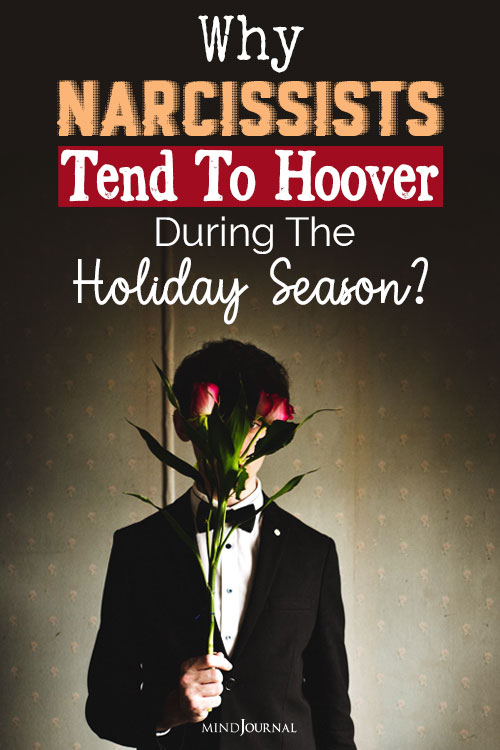Narcissists love playing mind games, especially during holidays when they’re not the main focus. Ever wondered ‘why do narcissists hoover their victims and despise holidays?’ Let’s explore the reasons behind their tricky and manipulative behavior this holiday season!
The period between Halloween and Valentine’s Day is a time when survivors of abusive relationships with a narcissist may experience what is known as a “hoover”
Often times narcissists will circle back to prior sources of narcissistic supply to see if they can tap (or suction up like a vacuum) prior targets’ attention/affection/adulation to fill their psychological void…be cautious and don’t be tempted with a re-hook!
Extreme narcissists cannot function without their perpetual need for ego fuel or narcissistic supply. Many have a homing device, zeroing in on their prior targets’ vulnerabilities and needs for validation.
When a survivor of psychological abuse has been discarded after an abusive relationship with a narcissist, the survivor generally speaking reels with confusion and a need to understand “why” they have been cruelly cast aside. Extreme narcissists know this.
The typical cycle of idealizing, devalue, discard is perpetuated as long as the target allows it, and the hoover is a prime opportunity to instigate a new abuse cycle.
Why Do Narcissists Hoover During Holidays?
Abusers will hoover around the holidays, typically after a silent treatment.
The survivor spins with cognitive dissonance and confusion of their former lover/ friend/ colleague/ family member vanishing without explanation and often after a healthy boundary has been set by the survivor. Narcissists do not compromise or reflect on their own accountability.

They are lacking the depth of empathy and compassion that is required for a healthy relationship. Extreme narcissists know that their former targets want the validation and understanding of “what went wrong’ in the relationship and will often instigate another idealization stage with their narcissistic supply sources.
Holidays are a prime time for narcissists to circle around like a shark to test the waters for lifeblood.
Targets often feel a sense of wistfulness and reminiscing of the good times when the idealization stage occurred with their former abuser. It is during this time of vulnerability that puts the survivor in danger of romanticizing the abusive relationship and having a sort of selective amnesia, recalling and longing for only the intense seduction stage at the beginning of the relationship.
Narcissists can’t stand losing center stage, and the holidays take away their spotlight unless they make themselves relevant again. Psychological abusers also like to hoover around their own birthdays, especially if they are narcissistic and think the world revolves around them (think developmental age of a 5-year-old).
Survivors of psychological abuse need to ramp up their efforts at No Contact and surround themselves with family and friends who are healthy and who show evidence of empathy, compassion, integrity, authenticity, compromise, accountability, honesty, and reciprocity.
Read 15 Things Narcissists Don’t Do
The aforementioned elements are essential for a healthy relationship. Also recommended would be for survivors to keep their calendar busy with distractions during the holidays that are productive and self-care affirming, such as exercise, meeting a friend for coffee, volunteering for a non-profit, engaging in expressive arts to reduce stress, meditation, and yoga exercises, and exposure to and infusions of nature.

Survivors may want to schedule booster sessions with their therapists to help them to stay No Contact and practice extreme self-care and healthy boundaries.
In addition, survivors can remind themselves why they are not with their former abusers by recounting the cycles of abuse which resulted in emotional pain and suffering.
Although it is difficult to regurgitate hurtful memories, drafting a timeline of the relationship on paper can help the survivor to be reminded that contact with the abuser always equates to emotional pain. No good can ever come out of a relationship with someone who sadistically causes psychological harm.
Related: Narcissists And Empathy: 6 Lies Narcissistic Parents Make Their Children Believe
A reminder that the idealization stage was also a fantasy and a facade by the narcissist is critical. Although the survivor was capable of falling in love, the narcissist preyed upon the target’s good nature and emotional IQ to extract narcissistic supply and dupe the target into falling in love. It was real for the survivor and false for the narcissist.

Survivors are often comforted when support networks provide hope and reassurance that they will not only survive the holidays but eventually thrive again.
Like any traumatic loss, the first holidays without a former lover/family member/friend is very hurtful and requires a mourning process. When the individual being mourned is a narcissist, the process is much more complicated and requires the survivor to exquisitely attend to their psychological needs.
With a competent trauma-informed therapist trained in narcissistic abuse recovery, unconditionally supportive and positive social support network, and self-care, a survivor will learn to thrive again, even during the holidays.
Narcissists Tend to “Hoover” During the Holidays…
Related: Hoovering: Ways A Narcissist Reels You Back In
Now you know why narcissists hate holidays. Make sure you drop a comment to share your thoughts in the comments below! Till then have a happy holiday 2023!
Originally appeared in Andrea Schneider, MSW, LCSW












Leave a Reply